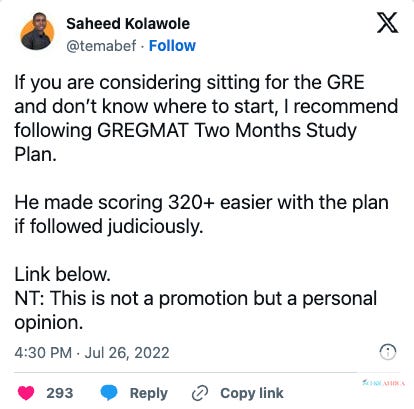A 4-Step Proven Framework for Acing Exams
Passing Exams is not about intelligence. It is all about preparation.
Welcome to issue #021 of ScholAfrica. Every Wednesday, I send an essay that helps you get the scholarships and visa you need to experience a better life abroad and give your family the life they deserve. If this was forwarded to you, you can subscribe here:

2 announcements before we start:
Bootcamp
The SA Scholarship Bootcamp is still open for enrollment.
(There is a 30% discount to make it more accessible. Only available for a limited time.)
The enrollment closes after 50 scholarship enthusiasts have signed up.
Newsletter
Thanks to everyone who voted last week. The majority of us voted for both education and scholarships, so every newsletter will have both starting today. At the bottom of this newsletter, you’ll see a weekly scholarship highlight.
Today, I’m going to show you how to get A’s in all your exams.
If you understand how to ace any exam, you have the key that opens the door to so many opportunities. You can apply this to your school exams, standardized tests (GRE, GMAT, IELTS, TOEFL, etc), and professional certification exams.
The fully funded PhD I’m currently enjoying is a result of the Exams I've written. 4.65/5.0 GPA in my Bachelor’s degree, 3.92/4.0 GPA in my Master’s degree, and a GRE score of 308 (163/170 in Quantitative). These were all Exams.
Sadly, many people study for exams but still fail because they don’t know how to prepare effectively.
Passing Exams is not about intelligence. It is all about preparation.
I’ve talked to many students eager for scholarships, but they don't get them because their scores aren't high enough.
The biggest challenges they face when preparing for exams are:
Lack of discipline
Bad preparation strategy
Not reading the right way
Preparing with the wrong materials
Here’s how to ace your exams, step-by-step:
Step 1: Develop a Daily Study Plan
"If You Fail to Plan, You Are Planning to Fail" - Benjamin Franklin
Without a detailed plan, you’ll never make it to the destination.
We can easily see how this applies to travelling, but it also applies to writing Exams. Based on the grade you want to get, you need to draw up a study plan that will give you that grade.
During my bachelor’s degree, as soon as the exam calendar is out, I would get pen and paper to write all the dates from that day till the last day of Exams. Then, on each day, I would write out the courses I wanted to study. I majorly did one course a day, but a few days I did 2. I arranged the courses based on proximity to the exam, my strength in that course, and available time.
You need to prepare this kind of plan for every exam you write. I did it for my master's and I’m still doing it for my PhD. You don’t have to wait till the Exam date is fixed, you can develop a 1-month or 2-month study plan for yourself.
To develop a study plan for standardized tests (e.g., GRE) and professional certifications, I strongly recommend conducting research to create the best plan. Ask people you know who wrote it and scored high scores. Even if you don’t know anyone personally, there are a lot of people on X, LinkedIn, and YouTube giving study plans.
Only listen to those with results.
For those of you planning to write the GRE, Greg Mat has a great 1-month or 2-month plan. One of my students used it to get 331/340. This is not a promotion, but his plan is highly recommended.
Step 2: Get the Right Materials
Using the wrong materials is one of the major reasons students fail exams.
Some lecturers only want to write what they taught you in class. If you are asked the meaning of “micro-economics,” for example, you should write exactly what they dictated in class. Some students, in an attempt to appear clever, use textbooks to prepare for their exams, and this often leads to failure. Now, some lecturers love you to use textbooks, but you have to know which kind is which and give them what they want.
Before every exam, learn about the lecturer grading the exam. Look for clues in the assignments they give, the responses they appreciate in class, and the assignments they grade correctly.
Remember, give them what they want.
For standardized tests and professional exams, you don’t know who will grade them. Some are even automatically graded. The good news is that the best resources are available online, especially for popular exams like the GRE.
There are both simple and advanced methods for finding the right resources.
Simple:
Find one mentor with the score you want to get, get all the resources they used, and use them religiously.
Advanced:
Look for 3-5 people with excellent results in that exam.
Write down all the resources each person recommends.
Look for similarities in their recommendations.
Use them to prepare.
Step 3: Observe The Reading Disciplines
Your great study plan can still fail if you don’t put the right disciplines in place.
Some students make excellent reading plans, but after two weeks, when I ask them about it, they start looking up and say things like, “Ehm...”, “Well...”, or “You know...”
To avoid this, there are three major disciplines you need to observe:
Time blocking
Focus environment
Accountability
Time blocking:
You need to have a specific time set aside every day for reading. It doesn't have to be the same time, but it should be defined.
This is what a 2-hour plan might look like:
Monday, Wednesday, Friday: 3-5 pm
Tuesday, Thursday: 12-2 pm
Saturday, Sunday: 7-9 pm
The secret to never defaulting on this time is to plan ahead. Let the people who might interfere with the time know ahead of time. Also, don’t say yes to anything that will eat into that time.
Once you have fixed it, guard it with your life.
Focus environment:
Where you read matters a lot; ensure your environment is clean and free from distractions. If you can access a library, I highly recommend it. If you have a desk and chair in your room/house (and you can lock yourself inside), then you can stay there.
When you start reading, put your phone on silent and keep it out of sight. All notifications can wait. All emergencies can wait. It’s only for 2 hours. This is why you need to let the important people in your life know about your plans so they understand your unavailability.
Accountability:
If you want to go fast, go alone. If you want to go far, go together. - African Proverb
There are 2 ways to do this.
You can get study buddies preparing for the same exam as you.
You can get a friend or mentor, tell them your study plan, and you can pick a date and time every week to give them an update.
I must say here that if you choose the first option and schedule a time to read together, it doesn’t replace your personal study.
No amount of group reading can replace individual reading.
Step 4: Read More in Less Time
I’m on a 4.0/4.0 GPA after 6 semesters of my PhD, while building an online business, simply because I know how to read more in less time.
I’ll share 3 principles with you today (never forget them, and you’ll be set for life):
Active Recall
Spaced repetition
Pareto principle (80/20 rule)
Here's what they mean:
Active Recall:
This is a learning method where you ask yourself questions to remember things, instead of just reading your notes and books over and over.
An easy way I do this is to have a reading note (hard or soft copy). In that note, write out a few definitions and important points in your own words, but also prepare questions for yourself. In between or after reading, pause to ask yourself those questions.
Flashcards are also a great way to remember things. They are very helpful for studying for standardized tests and professional exams.
Spaced Repetition:
This is where you space out your reading of one subject in increasing time intervals. For example, after 1 day, then 3 days, then 7 days, then 14 days. This spacing effect moves the information from your short-term to your long-term memory.
This can easily be reflected when you draw up the study plan. You must not observe the increasing time intervals; just ensure that each course is spaced out. This is why overnight reading doesn't work. It doesn't move to your long-term memory.
Pareto Principle:
Pareto principle (80/20 rule) states that 20% of the input leads to 80% of the output.
This applies to wealth, politics, school, and even your wardrobe. For example, you wear 20% of your clothes, 80% of the time. There are clothes you've not worn in a while.
So 20% of the topics, terms, and concepts are being asked in 80% of the exams. You need to find the 20% and make sure you internalize them when reading.
In Summary
Now you have all the tools to unlock any opportunity you want. The truth is, the people who finished with first-class degrees or scored 330/340 in the GRE aren’t more intelligent than you. They understand the best strategies for exam preparation.
Anytime you have an upcoming exam:
Develop a daily study plan
Get the right materials
Observe the 3 reading disciplines
Use the 3 reading principles to remember all that you read.
P.S. If you want to get fully funded scholarships to study in Canada, the US, or Europe, then the SA Scholarship Bootcamp is for you. You’ll learn all the scholarship application strategies, get essay/cold email templates to help you win, a review of your application documents, and a community of like-minded scholars. This is a screenshot from the last cohort.
Secure your 1/50 available slots here.
That’s it for today!
As always, thanks for reading.
Reply and tell me your biggest takeaway from today’s newsletter.
Weekly Scholarship Highlight:
Keele University SURF Scholarship Master's and PhD Scholarships in the UK 2026
Eligible Countries: Developing Countries
Scholarship Benefit
Full Scholarship
Living Stipend
£10,000 research allowance
Deadline: August 18, 2025
Application Link: https://www.keele.ac.uk/surf/apply/
If you found this post helpful, the best compliment I could receive would be if you shared it with one person or restacked it.
Whenever you're ready, there are 3 ways I can help you:
The SA Scholarship Bootcamp: This 6-week Bootcamp is designed to help you secure fully funded master’s and PhD scholarships in Canada, the US, and Europe by submitting high-quality applications in just 6 weeks, with expert guidance every step of the way. The next cohort begins on August 9th, 2025, and registration is currently open.
The Self-paced Masterclass: This self-paced masterclass shows you the 14 steps you need to get fully-funded US scholarships for master’s and PhD - no matter your CGPA. It’s perfect for applicants who have never applied before or those who consistently receive rejections or partial funding. Getting US scholarships is much easier than you think.
F1 Visa Interview Coaching Call: Get your F1 (study) visa in your next interview. I combine my five F1 visa interview experiences with my expertise in learning from visa officers to thoroughly prepare you for your visa interview. We will identify your strengths and prepare you to deliver them confidently. Your story is the secret to your visa approval.






